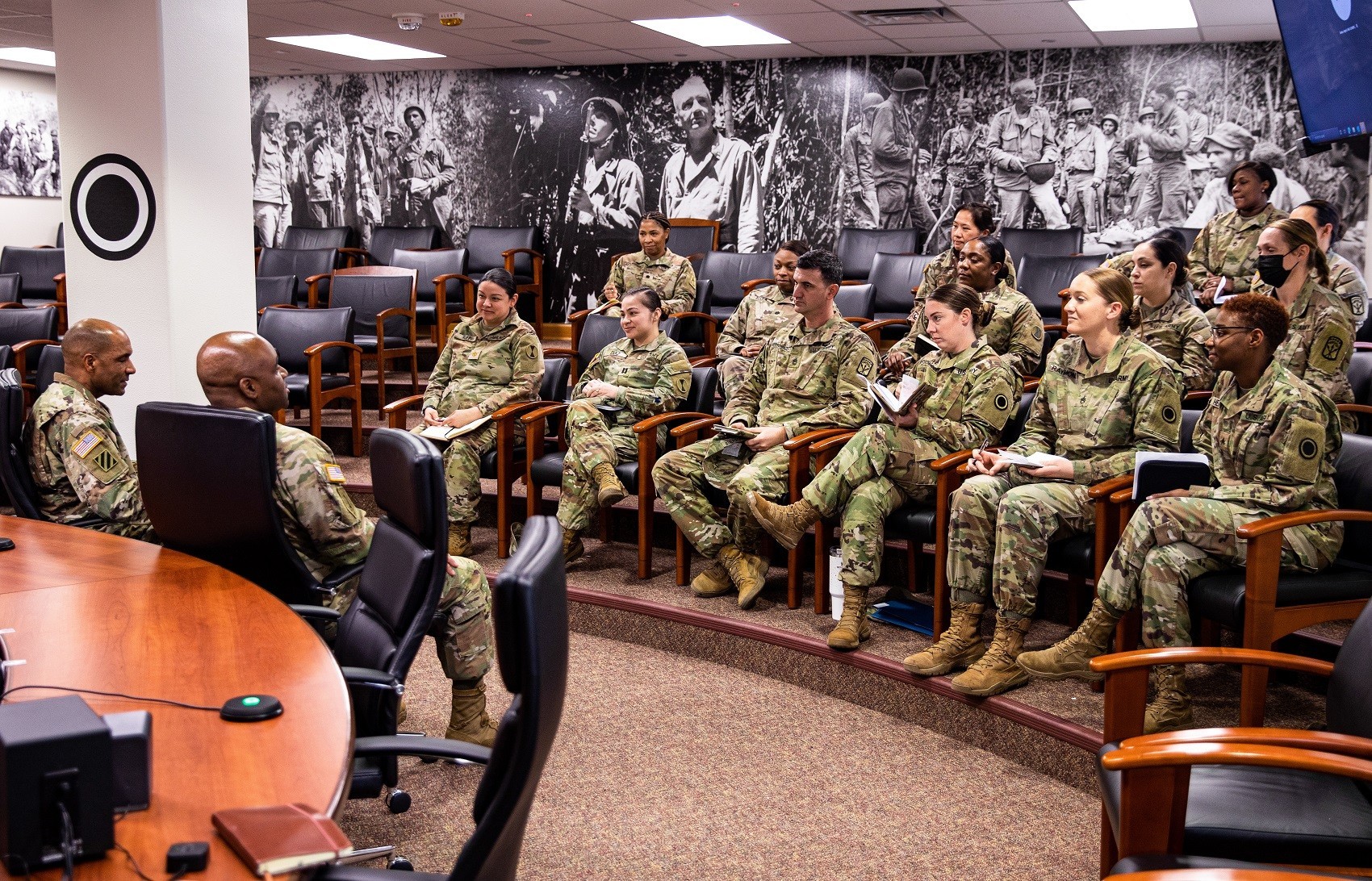U.S. Military/Pentagon
U.S. Army considers allowing LGBTQ troops to transfer from hostile states
Proposed guidance remains in draft form

A draft policy is circulating among top officials of the U.S. Army that would allow soldiers to be able to request a transfer if they feel state or local laws discriminate against them based on gender, sex, religion, race or pregnancy.
Steve Beynon writing for Military.com reported last week the guidance, which would update a vague service policy to add specific language on discrimination, is far from final and would need approval from Army Secretary Christine Wormuth. But if enacted, it could be one of the most progressive policies for the Army amid a growing wave of local anti-LGBTQ and restrictive contraception laws in conservative-leaning states, where the Army has a majority of its bases and major commands.
“Some states are becoming untenable to live in; there’s a rise in hate crimes and rise in LGBT discrimination,” Lindsay Church, executive director of Minority Veterans of America, an advocacy group, told Military.com. “In order to serve this country, people need to be able to do their job and know their families are safe. All of these states get billions for bases but barely tolerate a lot of the service members.”
This policy tweak to the existing Army regulations pertaining to compassionate reassignment would clarify the current standard rules, which are oft times fairly vague.
A source in the Army told Beynon the new guidance has not yet been fully worked out through the policy planning process or briefed to senior leaders including the Army secretary or the office of Defense Secretary Lloyd Austin.
“The Army does not comment on leaked, draft documents,” Angel Tomko, a service spokesperson, told Military.com in an emailed statement. “AR 600-100 and 600-200 establish the criteria for which soldiers may request for a compassionate reassignment. The chain of command is responsible for ensuring soldiers and families’ needs are supported and maintain a high quality of life.”

(U.S. Air Force photo by Airman 1st Class Valentina Lopez)
The Crystal City-based RAND Corporation had published a study on sexual orientation, gender identity and health among active duty servicemembers in 2015 that listed approximate six percent of LGBTQ troops are gay or bisexual and one percent are trans or nonbinary.
A senior analyst for RAND told the Washington Blade on background those numbers are likely much lower than in actuality as 2015 was less than four years after the repeal of ‘Don’t Ask, Don’t Tell’ and prior to when the Trump administration enacted the trans servicemember ban in 2017, which has had a chilling effect on open service.
The Biden administration repealed the Trump ban.
Another factor is that the current 18-24 year old troops colloquially referred to as “Gen Z” are much more inclined to embrace an LGBTQ identity and that would cause the numbers to be higher than reported.
Also factored in is uncertainty in the tweaking of policy in light of the recent leak of the draft U.S. Supreme Court decision that would effectively repeal Roe v. Wade.
According to Military.com it’s unclear whether the Army’s inclusion of pregnancy on the list would protect reproductive care for soldiers if Roe v. Wade is overturned. That language could be intended to protect pregnant service members or their families from employment or other discrimination, but could also be a means for some to argue for transfers based on broader reproductive rights.
One advocacy group pointed out that the current wave of anti-LGBTQ legislation will negatively impact the moral of service members:
“What we’re seeing across the board is a small group of elected officials who are trying to politicize and weaponize LGBTQ identities in despicable ways. They’re not only doing that to our youth, but the collateral damage is hurting our service members,” Jacob Thomas, communications director for Common Defense, a progressive advocacy organization, told Military.com. “[Troops] can’t be forced to live in places where they aren’t seen as fully human.”

U.S. Military/Pentagon
Hegseth orders Navy to rename Harvey Milk ship
Nancy Pelosi calls the move ‘a shameful, vindictive erasure’

Defense Secretary Pete Hegseth has ordered the renaming of the U.S. Naval Ship Harvey Milk, according to a report in Military.com on Tuesday.
Since 2016, the replenishment oiler has borne the name of the late gay rights icon, who served in the Navy during the Korean War, was separated from the service other than honorably to avoid being court martialed for his homosexuality, and then went on to become the the first LGBTQ candidate elected to public office in California.
Per the article, a memorandum from the Office of the Secretary of the Navy outlined the plans to rename the ship, and a defense official said the order to take this “rare step” came from Hegseth with an announcement deliberately planned for Pride month, on June 13.
The memo reviewed by Military.com indicates that the move comes as part of an effort to strengthen “alignment with president and SECDEF objectives and SECNAV priorities of reestablishing the warrior culture.”
Milk was assassinated in 1978 while serving on the San Francisco Board of Supervisors. U.S. House Speaker Emerita Nancy Pelosi (D), who has represented the city in Congress since 1987, said the decision is “a surrender of a fundamental American value: to honor the legacy of those who worked to build a better country” and “a shameful, vindictive erasure of those who fought to break down barriers for all to chase the American Dream.”
“Our military is the most powerful in the world — but this spiteful move does not strengthen our national security or the ‘warrior’ ethos,” she said.
Renaming a Naval ship is traditionally considered taboo, as well as a harbinger of bad luck.
During the Biden-Harris administration in 2023, however, a cruiser and research ship with names tied to the Confederacy were renamed — though Military.com notes that “the recommendation to rename the two ships came from a commission that was created by Congress to study names with ties to the Confederacy across the entire military.”
CBS on Tuesday reported that along with the Harvey Milk, the Navy is also considering renaming other John Lewis-class oilers including the USNS Thurgood Marshall, USNS Ruth Bader Ginsburg, and USNS Harriet Tubman.
U.S. Military/Pentagon
Pentagon urged to reverse Naval Academy book ban
Hundreds of titles discussing race, gender, and sexuality pulled from library shelves

Lambda Legal and the Legal Defense Fund issued a letter on Tuesday urging U.S. Defense Secretary Pete Hegseth to reverse course on a policy that led to the removal of 381 books from the Nimitz Library of the U.S. Naval Academy in Annapolis, Md.
Pursuant to President Donald Trump’s executive order 14190, “Ending Radical Indoctrination in K-12 Schooling,” the institution screened 900 titles to identify works promoting “diversity, equity, and inclusion,” removing those that concerned or touched upon “topics pertaining to the experiences of people of color, especially Black people, and/or LGBTQ people,” according to a press release from the civil rights organizations.
These included “I Know Why the Caged Bird Sings” by Maya Angelou, “Stone Fruit” by Lee Lai, “The Hate U Give” by Angie Thomas, “Lies My Teacher Told Me: Everything Your American History Textbook Got Wrong” by James W. Loewen, “Gender Queer: A Memoir” by Maia Kobabe, and “Democracy in Black: How Race Still Enslaves the American Soul” by Eddie S. Glaude, Jr.
The groups further noted that “the collection retained other books with messages and themes that privilege certain races and religions over others, including ‘The Clansman: A Historical Romance of the Ku Klux Klan’ by Thomas Dixon, Jr., ‘Mein Kampf’ by Adolf Hitler, and ‘Heart of Darkness’ by Joseph Conrad.
In their letter, Lambda Legal and LDF argued the books must be returned to circulation to preserve the “constitutional rights” of cadets at the institution, warning of the “danger” that comes with “censoring materials based on viewpoints disfavored by the current administration.”
“Such censorship is especially dangerous in an educational setting, where critical inquiry, intellectual diversity, and exposure to a wide array of perspectives are necessary to educate future citizen-leaders,” Lambda Legal Chief Legal Officer Jennifer C. Pizer and LDF Director of Strategic Initiatives Jin Hee Lee said in the press release.
U.S. Military/Pentagon
Air Force rescinds rule barring inclusion of preferred pronouns in email signatures
Conflict with language in military funding package may explain reversal

The U.S. Air Force has issued a “directive to cease the use of ‘preferred pronouns’ (he/him, she/her, or they/them) to identify one’s gender identity in professional communications,” according to a report published in the Hill on Wednesday.
The rule, which applies to both airmen and civilian employees, was first adopted on Feb. 4 pursuant to President Donald Trump’s anti-transgender executive order called, “Defending Women from Gender Ideology Extremism and Restoring Biological Truth to the Federal Government.”
Days after the administration’s issuance of that order on the first day of the president’s second term, the Office of Personnel Management instructed agencies across the whole of the federal government to remove pronouns from email signatures and enforce the policy barring employees from using them.
Additionally, on Jan. 27 Trump published an order barring trans people from joining the U.S. Armed Forces, indicating that those who are currently in serving would be separated from the military. The Pentagon is fending off legal challenges to the ban in federal courts.
Particularly given the extent of the new administration’s efforts to restrict the rights of trans Americans and push them out of public life, the Air Force’s reversal of the pronoun guidance was surprising.
According to reporting in Military.com, the move might have come because officials concluded the rule was in conflict with language in the military appropriations funding legislation passed by Congress in 2023.
The NDAA established that the defense secretary “may not require or prohibit a member of the armed forces or a civilian employee of the Department of Defense to identify the gender or personal pronouns of such member or employee in any official correspondence of the Department.”
-

 U.S. Supreme Court3 days ago
U.S. Supreme Court3 days agoSupreme Court upholds ACA rule that makes PrEP, other preventative care free
-

 U.S. Supreme Court3 days ago
U.S. Supreme Court3 days agoSupreme Court rules parents must have option to opt children out of LGBTQ-specific lessons
-

 India5 days ago
India5 days agoIndian court rules a transgender woman is a woman
-

 National5 days ago
National5 days agoEvan Wolfson on the 10-year legacy of marriage equality











